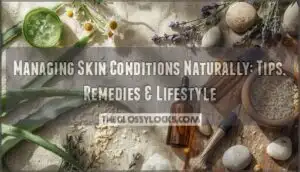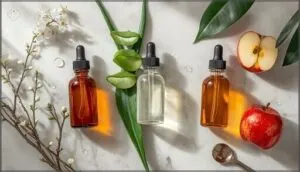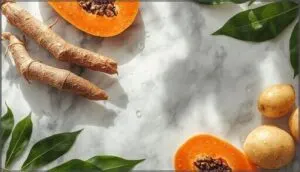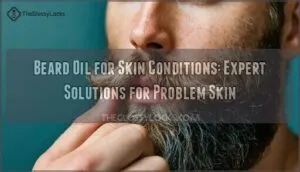This site is supported by our readers. We may earn a commission, at no cost to you, if you purchase through links.
Your skin doesn’t always need a prescription to heal. While dermatologists reach for medications daily, we also recognize that many people successfully manage conditions like eczema, acne, and psoriasis using natural approaches—sometimes as their primary treatment, sometimes alongside conventional care.
The evidence supporting remedies like tea tree oil for acne or colloidal oatmeal for eczema continues to grow, with clinical trials showing measurable improvements in inflammation and symptom relief.
What matters most isn’t choosing between “natural” and “medical” camps, but understanding which strategies work for your specific condition, how to use them safely, and when professional guidance becomes essential for protecting your skin’s long-term health.
Table Of Contents
Key Takeaways
- Natural remedies like tea tree oil (5% concentration) and colloidal oatmeal show measurable clinical benefits for conditions like acne and eczema, with some studies documenting 28-46% improvements in symptoms when used consistently over 4-12 weeks.
- Your daily habits—including stress management, sleep quality, gut health through probiotics, and proper hydration—directly impact skin inflammation and barrier function, with clinical data showing 15-30% improvements when these lifestyle factors are optimized.
- Effective skin care requires layering strategies correctly: apply humectants first for hydration, follow with barrier-repairing ingredients like ceramides, and always use broad-spectrum SPF 30+ since UV exposure causes up to 80% of premature aging.
- Professional evaluation becomes essential when symptoms worsen after 4-6 weeks of consistent treatment, when you notice signs of infection, or when combining natural and medical approaches to ensure safety and maximize effectiveness without harmful interactions.
Why Skin Conditions Develop
Your skin doesn’t break out in hives or flare up with eczema without reason. Behind every rash, patch of dryness, or stubborn breakout lies a combination of triggers—some you can control, others you mightn’t even realize are at play.
Every skin condition has a cause—some triggers you control, others you don’t even know exist
Let’s look at the main culprits that set the stage for skin conditions to develop.
Common Causes of Skin Issues
While genetics may load the gun, it’s often environmental factors that pull the trigger with skin conditions. Understanding what causes these issues gives you power to manage them effectively.
Here are five common culprits behind skin problems:
- Genetic predisposition – Your DNA influences susceptibility to conditions like eczema and psoriasis
- Allergic reactions – Contact with irritants or allergens sparks inflammation
- Hormonal imbalances – Fluctuations during puberty, pregnancy, or menopause affect your skin
- Immune dysfunction – Overactive immune responses trigger chronic conditions
- Underlying health conditions – Diabetes, thyroid disorders, and other diseases manifest through skin changes
To develop a full picture, consider exploring qualitative research methods for deeper insights.
Role of Lifestyle and Environment
Your daily habits shape your skin more than you might expect. Sun exposure, air pollution, and climate change can trigger flares in conditions like eczema and psoriasis—urban dwellers face 15–25% higher risk. Occupational factors, poor sleep quality, and chronic stress disrupt your skin barrier, while lifestyle changes like stress management and improved hygiene can reduce symptoms considerably.
Considering the impact of environment, it’s important to note that climate change is pressing for everyone. Your environment isn’t just background noise.
Impact of Diet and Stress
What you eat and how you handle stress show up on your skin, often in surprising ways. Inflammation triggers from a poor diet or unmanaged stress hormones can worsen skin inflammation.
A balanced diet, rich in antioxidant intake and mindful of your gut microbiome, along with proper hydration levels and stress management, all support internal health and a truly healthy lifestyle.
Natural Remedies for Common Skin Conditions
Many people turn to natural remedies when dealing with frustrating skin issues, and there’s good reason for that. Certain plant-based ingredients have properties that can genuinely help calm inflammation, fight bacteria, or restore balance to your skin.
Let’s look at some evidence-backed options for acne, eczema, psoriasis, and hyperpigmentation that you might consider trying.
Acne: Tea Tree Oil, Aloe Vera, Apple Cider Vinegar
You’ve probably heard about tea tree oil, aloe vera, and apple cider vinegar for acne—but do they actually work? TTO effectiveness is real: 5% tea tree oil reduced lesions by 46% in one trial, rivaling benzoyl peroxide.
Aloe benefits include faster healing when combined with salicylic acid.
ACV dilution matters—never apply it undiluted. Always do patch testing before trying combination therapy, and dilute properly to avoid irritation.
Eczema and Dermatitis: Oatmeal, Chamomile, Coconut Oil
For calming eczema flare-ups, colloidal oatmeal baths can reduce itch intensity by 28% and improve your skin’s barrier function. Chamomile relief comes from anti-inflammatory compounds that soothe irritation, while coconut hydration with twice-daily application increases moisture and fights infection-triggering bacteria.
These natural emollients work similarly to standard moisturizers for eczema prevention, though you’ll want to patch-test first to confirm you don’t have rare sensitivities.
Psoriasis: Aloe Vera, Turmeric, Herbal Preparations
Psoriasis plaques often respond to gentle natural interventions alongside your usual care. Aloe vera efficacy shows 30–40% lesion reductions with topical gel, while turmeric bioavailability improves when you take 1,000–2,000 mg with black pepper. Here’s your approach:
- Apply standardized extracts with verified concentrations
- Monitor for essential oil safety with patch tests
- Choose herbal combinations backed by controlled trials
- Combine natural options with dermatologic care to manage skin inflammation effectively
Hyperpigmentation: Licorice Root, Papaya, Potato Juice
Dark spots and uneven tone can fade with targeted natural remedies. Licorice benefits include 18% pigment reduction at 0.5–4% topical concentrations in 12-week trials, while papaya enzymes offer modest lightening over 8–12 weeks. Potato juice efficacy remains less proven, with sparse clinical data.
Long-term safety isn’t well established for these hyperpigmentation treatments, so patch-test before use and consult your dermatologist for persistent concerns.
Holistic Habits for Healthy Skin
Healthy skin isn’t just about what you put on it—it’s about how you care for it every day. The right habits can strengthen your skin’s natural defenses, prevent flare-ups, and support long-term health.
Let’s look at three foundational practices that make a real difference.
Hydration and Moisturizing Techniques
Think of your skin barrier as a brick wall—hydration provides the water, while moisturizing supplies the mortar. Your routine should layer humectant benefits from glycerin or hyaluronic acid first, then add emollient science with ceramides, and seal everything with occlusive layers like dimethicone.
Match products to your skin types: dry skin needs richer formulas, while oily skin responds better to lightweight options applied twice daily.
Sun Protection and Skin Barrier Support
Sun damage isn’t just about sunburn—UV exposure drives up to 80% of premature aging and weakens your skin barrier by 15–25% after weeks outdoors.
You need broad-spectrum SPF 30 or higher, applied correctly at 2 mg/cm² and reapplied every two hours.
Pair sunscreen with barrier-strengthening ceramide moisturizers and microbiome-supporting formulas to boost UV damage repair and adherence.
Gentle Cleansing and Exfoliation
Your skin barrier thrives when you cleanse gently and exfoliate strategically. To protect sensitive skin while managing natural remedies for skin conditions, follow these proven skin care practices:
- Use mild cleansers with pH ~5.5 twice daily with lukewarm water—not hot—to reduce irritation by 9–25%.
- Choose gentle skincare products that are sulfate-free and fragrance-free to preserve barrier hydration.
- Apply natural exfoliation methods (salicylic acid 0.5–2% or enzyme-based) just 1–2 times weekly.
- Always prioritize ingredient safety by patch-testing new natural skin care remedies first.
Proper exfoliation frequency prevents the 6–9% barrier disruption seen with daily use.
Diet and Lifestyle for Skin Health
What you eat and how you live can show up on your skin faster than you might think. Your daily habits—from what’s on your plate to how you manage stress—directly influence your skin’s ability to heal, protect itself, and stay resilient.
Let’s look at three foundational areas where simple changes can make a real difference in your skin health.
Antioxidant-Rich Foods and Supplements
When you load your plate with colorful fruits and vegetables, you’re giving your skin a real advantage. Research shows that increasing antioxidant-rich foods can reduce skin inflammation by 18% in acne-prone individuals.
Supplements like vitamin C and E improve hydration, while omega-3 fatty acids ease inflammatory symptoms by 15%. These antioxidants, along with healthy fats, offer tangible skin health benefits you can measure.
Benefits of Probiotics and Gut Health
Beyond food, your gut’s bacterial balance speaks directly to your skin through the gut-skin axis. Probiotics—especially Lactobacillus and Bifidobacterium strains—can reduce eczema severity by 12–24% and lower acne lesion counts by about 9%. When you support microbiome diversity, you’re strengthening your skin’s defenses from the inside.
Here’s what probiotic strains can do for you:
- Calm inflammatory flare-ups by lowering circulating inflammatory markers that trigger redness and irritation
- Strengthen your skin barrier through improved hydration and reduced transepidermal water loss
- Support your skin microbiome by promoting beneficial bacteria and crowding out harmful colonizers
- Boost treatment outcomes when combined with your regular skincare routine and healthy lifestyle habits
Clinical outcomes show that multi-strain formulations at 1–10 billion CFU daily work best over 8–12 weeks. Remember, dosing considerations matter—probiotics complement, but don’t replace, standard care for moderate-to-severe conditions.
Sleep, Stress Management, and Skin
What you eat matters, but how well you rest and handle pressure may matter just as much. Sleep deprivation and stress flare-ups disrupt your skin microbiome and barrier recovery by 20–30%.
Adequate sleep, stress management, and integrated protocols restore balance—integrative approaches combining sleep hygiene with gentle skincare cut inflammatory flare-days by 22% over three months, supporting overall wellbeing and healthy lifestyle goals.
Herbal and Traditional Skin Treatments
Herbal remedies have been used for centuries to treat skin conditions, and many of these traditional approaches still hold value today. From essential oils to complete systems like Ayurvedic medicine, these natural treatments offer different ways to support your skin’s health.
Let’s look at some of the most widely used herbal and traditional options, what they’re meant to do, and how you might incorporate them safely.
Popular Herbal Remedies and Their Uses
Regarding botanicals and skin health, a handful of herbal remedies for skin conditions show genuine promise. Tea tree efficacy for acne reaches about 34–64% improvement in lesion counts over 45–90 days. Aloe vera benefits include 20–40% itch reduction in eczema cases, while chamomile for dermatitis and coconut oil hydration demonstrate measurable relief.
For psoriasis relief, aloe formulations modestly reduce plaque thickness when you combine them with standard phytotherapy approaches.
Ayurvedic and Traditional Medicine Approaches
In Ayurvedic medicine and Traditional Chinese Medicine, you’ll find dosha imbalances and pulse diagnosis guiding herbal treatment. However, evidence for traditional medicine and dermatology remains modest:
- Curcumin formulations reduce psoriasis plaques by 12–24%
- Neem topical substances combat acne bacteria in vitro
- Sesame oil improves skin barrier function preliminarily
- Dietary prescriptions yield variable individual results
- Herbal remedies for skin conditions lack rigorous controlled trials
Approach these herbal formulations cautiously, consulting your dermatologist first.
Essential Oils and Their Applications
When you’re exploring essential oils as natural treatments for skin conditions, dilution matters most. Tea tree oil at 5% concentration reduced acne lesions by 5–20% in trials, while chamomile at 0.5–2% eased dermatitis itch.
Always patch-test these home remedies first—blend synergies and antiinflammatory properties show promise, but research gaps remain.
Application methods and safety precautions prevent irritation in herbal skin treatments.
When to Seek Professional Guidance
Natural remedies can work wonders for many skin concerns, but they’re not always the right answer. Some conditions need a trained eye and medical expertise to diagnose properly and treat safely.
Let’s look at when it’s time to put down the tea tree oil and pick up the phone to call a dermatologist.
Identifying Serious or Persistent Symptoms
Your skin gives clear signals when home remedies aren’t cutting it. Treatment resistance after 4–6 weeks of consistent natural care means it’s time for specialist referral. Watch for these red flags demanding professional attention:
- Worsening symptoms despite treatment—spreading redness, new lesions, or pain
- Infection signs—fever, warmth, pus, or rapid skin changes
- Scarring concerns—deep nodules, persistent marks, or tissue damage
Chronic skin conditions need medical eyes.
Combining Natural and Medical Treatments
Many patients—over half with chronic skin conditions—now use natural remedies alongside prescription medications, and this treatment integration can work beautifully when done right. Healthcare professionals can personalize this approach, combining the best evidence-based botanicals with conventional therapies designed specifically for your skin’s needs.
You’ll want your dermatologist monitoring progress to confirm safety considerations are met and efficacy synergy happens without unwanted interactions.
Consulting a Dermatologist for Diagnosis and Care
Even minor skin concerns deserve expert eyes—early diagnosis catches problems that home remedies can’t address. Dermatologists use tools like biopsy confirmations and dermoscopy to pinpoint what’s actually happening beneath the surface.
You’ll get regimens designed specifically for your skin, with staged follow-ups ensuring treatment works. Teledermatology triage now makes specialist care more accessible, cutting wait times and connecting you with healthcare professionals who can fine-tune your approach.
Frequently Asked Questions (FAQs)
How long until natural treatments show visible results?
You’ll generally notice improvements within 4–12 weeks, though acne may respond by week four and eczema relief often starts around week three.
Consistency, severity, and individual skin type all influence your Treatment Timelines and realistic expectations.
Are natural remedies safe during pregnancy or breastfeeding?
You should exercise caution with natural remedies during pregnancy or breastfeeding. While some treatments like aloe vera and coconut oil are generally safe topically, always consult your dermatologist first.
Can I use multiple natural remedies simultaneously?
A patient once layered five different oils on eczema patches, triggering severe irritation. You can combine natural remedies, but start with just one or two. Patch-test each, introduce them gradually, and watch for unexpected reactions or sensitivities before expanding your routine.
Do natural treatments work for all skin types?
Natural remedies show variable skin type efficacy—some work broadly, while others need remedy personalization. Sensitivity concerns differ by skin condition, and treatment duration varies.
Combination therapies often improve comprehensive skin care outcomes for natural healing.
Conclusion
Your skin is your most visible asset—and managing skin conditions naturally isn’t about rejecting medicine, it’s about giving yourself proven options. Whether you’re using tea tree oil for breakouts or colloidal oatmeal baths for eczema, these evidence-backed remedies work best when paired with consistent habits: hydration, sun protection, and stress management.
Start with one change, monitor your results carefully, and remember—persistent symptoms always deserve professional evaluation to protect your skin’s future.












